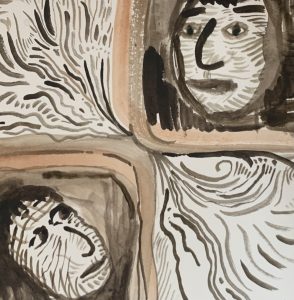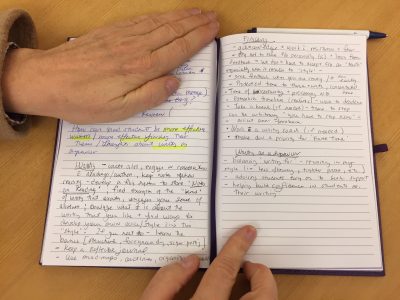By Madeline Walker
What is “voice” in writing? Is it some magical, authentic quality that captures and conveys the author’s identity? Well, sometimes it seems that way. Just as babies can pick out their mother’s particular timbre and register from a cacophony of female voices, we recognize the writing of our favourite writers before we even see the byline that identifies them.
Yet there is nothing mysterious or magical about “voice” if we consider it to be the combined effect on the reader of features a writer chooses from (deliberately or not). That package of features comprises a writer’s style or voice and thereby make it possible to imitate them.
Think of a fiction writer with a unique voice or style, such as Ernest Hemingway. He is famous for using few adjectives and employing lots of repetition. He was also a great fan of “and” and what’s known as polysyndeton (using lots of coordinating conjunctions between clauses). Here’s an excerpt from his short story, “After the Storm.”
I said, “Who killed him?” and he said, “I don’t know who killed him but he’s dead all right,” and it was dark and there was water standing in the street and no lights and windows broke and boats all up in the town and trees blown down and everything all blown and I got a skiff and went out and found my boat where I had her inside Mango Key and she was all right only she was full of water.

These recognizable features of Hemingway’s writing—few adjectives, repetition, and polysyndeton, among others—mean that it’s easy to imitate and even parody his writing.
Over the past 50 years, research on authorial voice has shifted from thinking of voice as the property of the individual to voice as a societal phenomenon (our society, in part, writes us), and finally, to the “dialogic” view where the freedom of the individual voice is in tension with the constraints of society (Mhilli, 2023). The “dialogic” view on voice captures the push-pull of many academic writers—I want to write like this (in my voice), but academic genres constrain me; I must write in a standardized style determined by my discipline.
These constraints do indeed exist, but there are academic writers who push against them. It depends on the discipline, of course. There is more leeway in the humanities and social sciences to infuse writing with personal style, whereas scientific and technical writing often—but not always—demand an impersonal style. And graduate students, of course, have many more writing-style-gatekeepers than do faculty members and independent researchers.
In her book Stylish Academic Writing (2012), Helen Sword argues that academic writing can be engaging and stylish, and she gives numerous examples where authorial voice is clear and identifiable, whether through humour, detail, vocabulary choice, or syntax or a combination of all of these. And no, use of first person isn’t required to convey voice. For example, Sword writes,
Some authors, especially in the humanities, craft third-person prose that is nonetheless imbued with subjectivity and character: “Settled by an extraordinarily literate people and long privileged by the American history establishment, colonial New England’s every square inch has been seriously scrutinized. Or so the conventional wisdom has it. Consider this: Scholars have missed only 100,000 square miles, more or less, of terrain known intimately to seventeenth- and eighteenth- century villagers—the coastal ocean and its seafloor. The irony is superb, for the area seaward of the shore was the first part of the northwest Atlantic reconnoitered by Europeans.” [History] (p. 42)
What about your academic writing voice? Do you have one? Where does it reside? Take a couple of pages of academic text you’ve written and analyze it. What sentence structures do you use? Take note of vocabulary. Do you have writing “tics,” for example, the same transition or phrase (“in other words,” or “moreover”) used over and over? Do you have favourite punctuation marks that you employ frequently, for example double em dashes? These elements are the features that make up your academic voice / style, and you can manipulate them if you wish. Think about the choices available to you. Are you constrained by disciplinary expectations? Could you experiment? Do you want to?
You are invited to a workshop on Writer’s Voice to share your ideas on this topic:
Discover your Academic Writing Voice, 9 to 10am and 3 to 4 pm, May 31; Zoom: https://uvic.zoom.us/my/madelinewalker No registration necessary
Voice is a contested notion in writing studies. Do you have an authentic voice, or does society prescribe how you write? We are socially constructed beings, but at the same time, we can create voices that bring our personalities to the page. During this workshop, we’ll talk about what it means to write in your own academic voice. Contact Madeline (caceal4@uvic.ca) for more information.
References
Mhilli, O. (2023). Authorial voice in writing: A literature review. Social Sciences & Humanities Open, 8(1), 100550–. https://doi.org/10.1016/j.ssaho.2023.100550
Polysyndeton and Hemingway excerpt: http://rhetoric.byu.edu/Figures/P/polysyndeton.htm
Sword, H. ( 2012). Stylish academic writing. Harvard University Press.
Watercolour illustration by Madeline Walker


